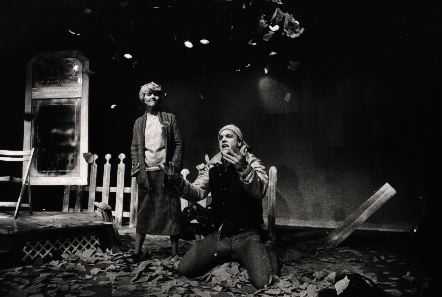Canadian Theatre Encyclopedia
Odd Jobs

Drama in two acts by Frank Moher, commissioned by Catalyst Theatre and first performed at Theatre Network, Edmonton, Alberta, October 10, 1985 with Mary Monks, Eric Kramer, Christine MacInnis, directed by Jan Selman, designed by Morris Ertman. Subsequently performed at Canadian Stage, Prairie Theatre Exchange and Alberta Theatre Projects among many other companies in Canada, and in Florida, Indiana, and California in the United States as well as in Ireland, New Zealand, and four times in Japan by Tokyo's Bunkaza Theatre in a translation by Toyoshi Yoshihara. Translated as L'homme a tout faire by Laurier Gareau and Simone Verville, it was performed by Troupe du Jour, Saskatoon, Saskatchewan (1991). It was a finalist in 1987 for the Governor Generalís Award; finalist, 1989, Chalmers Award; winner, 1993, Los Angeles Drama-Logue Award. It is published by International Readers' Theatre.
The success of this work is not difficult to explain. It is a one-set, three-character drama, delivered in the gentlest of tones, and recounts, without false emotion, the intertwined lives of three people who are trying to find self-worth in their work.
Moher has woven around them a plot-line so delicate that the events of the play, occasionally quite dramatic, are still organic and inevitable. The piece is a watercolour.
Tim, unemployed, injects himself into the life of an old woman, Mrs. Phipps, who is barely holding on to reality. Her mind is plagued by two forces: vivid memories of her youth and the logical, practical systems of her life as a mathematician. Meanwhile, Tim's wife has discovered success via courses she has taken and has accepted a job which will require Tim to abandon Mrs. Phipps. Circumstance, without grand-opera, surround the characters. A startling climax which a lesser writer might have pushed into soft-tragedy, is handled deftly by this writer who clearly cares profoundly for the characters he has created.
Strongly reminiscent of Chekhov's works, but, more to our purposes, Marcel Dube's Le temps des lilas.
Reviews for the work have been positive with Liz Nicholls of the Edmonton Journal writing, "...it manages, in the counterpoint of its three characters, to generate real anger, real warmth, real passion - not some half-baked polemical substitute." Gerry Colgan of Dublin's Irish Times referred to the work's, "deceptive simplicity," with Sylvie Drake, of the Los Angeles Times, similarly writing, "It is a small, tightly woven work, whose title doesn't begin to suggest the mathematical equation that connects the three chracters, like the points of a triangle."
Further Reading: Anne Nothof. "Collective Creativity: Working Odd Jobs, Canadian Drama 13.1 (1987): 34-42.
Commentary by Gaetan Charlebois
Last updated 2021-07-13

